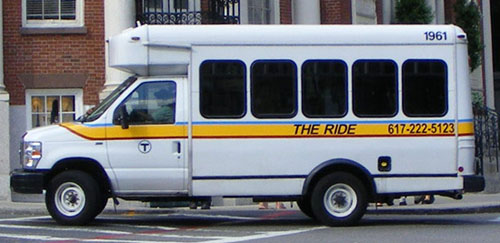Rather than Cut The Ride’s Services, Change the Service Delivery Model
On December 14th, the MBTA’s Fiscal and Management Control Board (FMCB) met to discuss how to rein in the agency’s spending and debated making changes to its paratransit system, The Ride.
The FMCB faces a daunting task. The MBTA is plagued with financial woes, including $5.5 billion in outstanding debt and $7 billion in deferred maintenance. That alone translates into $5,000 dollars per each of the commonwealth’s 2.5 million households. This is on top of the MBTA’s current budget shortfall of $170 million this year, annual operating losses, expensive collective bargaining agreements, and unexpected cost overruns with the Green Line Extension project. The agency definitely needs to make some cuts.
The FMCB has proposed a real innovation for MBTA paratransit: using Uber, Lyft, and taxis for certain trips, specifically the 80 percent of trips that don’t require wheelchair accessible vans. Massachusetts would be the first transit agency in the country to enter a contract with the popular ride sharing companies. This would steeply cut the cost of the current system that uses three large vendors under a $916 million seven-year contract, which is subject to cancellation at the discretion of the MBTA. According to a state official, this initiative could save the MBTA up to $47 million a year. Judging from the reaction of paratransit advocates at the latest FMCB meeting, the idea of the MBTA using Uber is a popular one.
As Greg Sullivan pointed out last April, a one-way trip on The Ride costs the MBTA an average of $49.88. This could be cut in half or more by using private transportation services such as taxis and Uber under a coordinated broker model. Massachusetts regional transit authorities and other public transit systems in the U.S already use a coordinated broker model to facilitate savings.
At the hearing, the FMCB listened to public testimony about another money-saving option: cutting existing paratransit service to areas that are considered “premium,” or those outside ADA-required ¾ mile radius from fixed-route service, which is an allowed option for transit agencies under the provisions of the ADA.
Pioneer believes that the MBTA should not restrict The Ride to the minimum ADA standard.
Pioneer’s Greg Sullivan attended the latest FMCB meeting and listened to the compelling and thoughtful testimony of “premium” paratransit users and advocates against the proposal. Advocates explained that many people have based their choice of housing location on access to The Ride. For the MBTA to change the rules now and restrict service to certain areas, advocates explained, would effectively force users who depend upon The Ride to relocate to within the ¾ mile radius. Greg testified that the proposal is problematic for that reason.
The potential savings attributable to restricting The Ride to the ¾ mile corridor is approximately $10-11 million, based upon current contract costs. But if the FMCB innovation of moving to a broker contract/Uber system is adopted, overall per-ride costs will drop, thereby reducing the potential savings to approximately $5 million. In Pioneer’s view, $5 million in savings is not worth the hardship and disruption the change will cause.
After listening to the compelling public testimony at the hearing, the FMCB did the right thing. They did not vote to approve the proposal to restrict The Ride, as many had expected and feared, deciding instead to look for alternative ways to control costs.
One option is for the agency to encourage transit-providers of The Ride, such as taxis and Uber, to do a better job of coordinating paratransit rides with fixed-service routes. Rather than using The Ride for their entire trip, passengers could save both the MBTA and themselves money by using paratransit services to get to existing handicap-accessible transit routes. In fact, the Federal Transit Agency’s Interagency Transportation Coordinating Council on Access and Mobility (CCAM) has recognized Florida, Maryland, North Carolina, Ohio, and Washington for their coordinated paratransit systems. Utilizing The Ride as complementary to the existing public transportation system would generate even more savings.
Even with the current dire fiscal situation at the T, The Ride’s premium service is critical to seniors and persons with disabilities, as testimony at the hearing demonstrated. The FMCB showed wisdom in not proceeding with the idea of limiting paratransit service to the ADA minimum level and will accomplish an unprecedented success if using Uber and Lyft finally brings The Ride’s excessive per-ride costs under control.
Follow Jim on twitter at @jimstergios, visit Pioneer’s website, or check out our education posts at the Rock The Schoolhouse blog.
Lauren Corvese is a student at Northeastern University working as a Research and Programs Assistant at Pioneer Institute through the Co-op Program. Lauren tweets at: @laurencorvese



